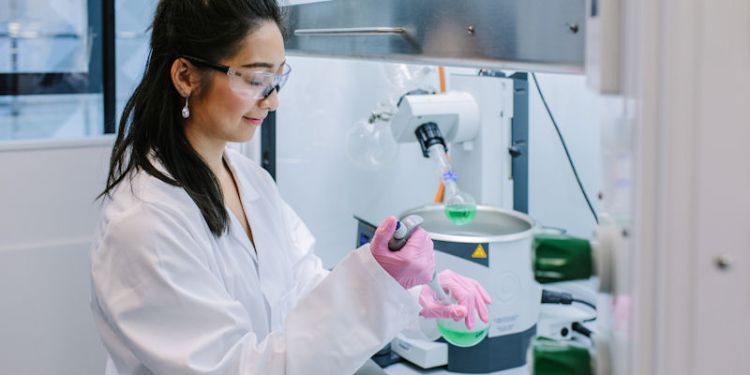Research facilities

Our researchers have access to a range of specialist facilities and laboratories to facilitate world leading research. Undergraduate and Masters students may benefit from these facilities during their project work. Our facilities are supported by dedicated and experience technical staff.
Our food colloids and processing laboratories are equipped with state of the art equipment to investigate the colloidal nature of foods; from the macro- to the nanoscale; specialist equipment include interfacial rheometers; advanced ultrasound spectroscopy; surface tension apparatus (static and oscillatory Wilhelmy plate and drop/bubble shape); contact angle; Langmuir troughs; controlled stress rheometers; texture analysers; tribometers; Foamscan and specialized bubble-forming rigs and pressure drop apparatus for foam stability measurements.
We have a range of scattering equipment to investigate physical characteristics of food materials such as crystal morphology; specialist equipment includes in-house small and wide angle X-ray scattering (SAXs & WAXS) plus special access to faculties at Diamond; light scattering apparatus for particle sizing and electrophoretic mobility of aqueous and non-aqueous dispersions; UV/Vis spectrophotometry and differential scanning calorimetry (DSC).
The School is well equipped with microscopy facilities including light microscopy; Brewster angle microscopy; atomic force microscopy (AFM); confocal laser scanning microscopy (CLSM) and ultrasound microscopy. We also have access to world leading electron microscopy facilities.
We have developed ultrasound techniques to assess food quality, specialised equipment includes ultrasound velocity meters and the Acoustiscan apparatus for monitoring creaming/sedimentation.
We are part of the White Rose High Performance Computer initiative, allowing access to the state of art computing facilities at the Universities of Leeds, Sheffield and York for implementation of in-house and open access code for the latest Monte Carlo and Brownian Dynamics simulations.
We have developed in vitro digestion systems to evaluate bioavailability of nutrients and combine these with cell culture facilities to investigate the mechanism by which food components affect metabolism and health.
Food chemistry and biochemistry
In Food chemistry and biochemistry, we host a range of analytical equipment to analyse food components and metabolites. Specialised equipment include HPLC and GC analytical equipment (together with single or triple quadrupole mass spectrometer, fluorescence, a sophisticated automated AKTA protein purification set-up, sophisticated automated AKTA protein purification set-updiode array and coularray detectors), and a sophisticated protein purification set-up. We can also analyse a range of biopolymers using asymmetric flow field-flow-fractionation size exclusion chromatography with multi-detection (MALS-DRI-UV/VIS-DLS). We also have an electronic nose and headspace GC-MS to detect changes in food volatile profiles.
Nutrition and public health
In Nutrition and public health, we apply a variety of modern molecular, cellular biology techniques including high- transcriptomics, proteomics and metabolomics to study the mechanisms by which nutrients affect cell function and metabolism at the tissue, cellular and molecular levels, human body composition (BodPod), resting energy expenditure (using a state-of-the-art metabolic system - Cosmed Quark RMR) and exercise-induced energy expenditure. Significant investment (>£1 million) has gone into brand new modern molecular and proteomics laboratories alongside with a new mammalian class II cell culture facility. High performance computing helps support the work of the Epidemiology group, and some work is done in collaboration with Leeds Institute for Data Analytics.
We design, develop and evaluate interventions aimed at improving health for individuals and populations, or assess the impact of health policy and practice at population level in the UK and abroad. Accordingly we have facilities set up for running human studies including glycaemic and metabolic analysis trials with expertise in venous sampling, spirometry, anthropometry and body composition.
We have facilities for sensory evaluation and can perform consumer panel assessments of foods and food concepts.
Working with business
We are committed to sharing our facilities and associated expertise with external academic and industrial collaborators. Find out more.

